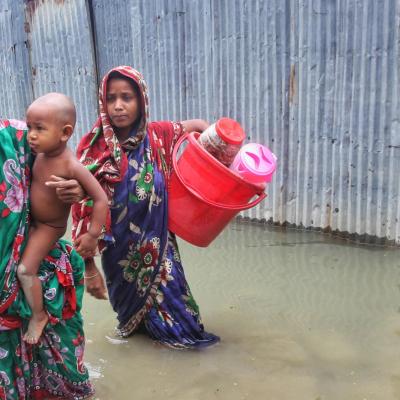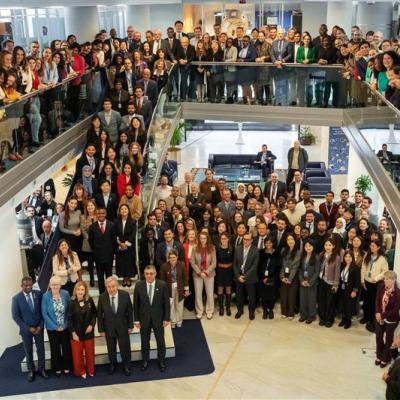Call to Action by the WMO Secretary-General on Accelerating the Implementation of the Early Warnings for All Initiative
The Early Warnings for All (EW4All) initiative is our collective commitment to protect every human being through effective and sustained multi-hazard early warning systems. The global effort to achieve universal early warning coverage is already marked by the leadership and determination of WMO Members. Across regions, governments and institutions have demonstrated that when science, political will, and international solidarity come together, meaningful progress follows. National roadmaps, strengthened institutional frameworks, and the increasing adoption of standardized alerting protocols reflect a shared commitment to ensuring that early warnings are timely, actionable, and accessible to all.
Innovation is driving this momentum forward. Members are advancing new technologies, enhancing observing networks, expanding digital alerting services, and fostering stronger regional cooperation. Investments in foundational infrastructure are improving data exchange and hazard monitoring, while collaborative partnerships are enabling more integrated and people-centred approaches. These developments show that with coordinated action and sustained support, effective early warning systems can become a reality everywhere, saving lives, protecting livelihoods, and strengthening resilience.
Yet, these milestones mark only the beginning of what is needed. While significant progress has been made since the launch of the EW4All initiative in 2022, critical gaps remain in financing, institutional coordination, and equitable access. Building on our collective progress requires continued ambition: accelerating implementation, deepening cooperation, and scaling innovation to close critical gaps. The foundations are clear: free and open data exchange, sustainable financing, adherence to international standards, and coordinated scientific cooperation.
The Imperative for Action
Weather, climate and water-related hazards are intensifying, with devastating consequences for lives, livelihoods, and are inflicting billions of dollars in economic losses. Yet we know that early warning systems save lives and reduce losses: every dollar invested can yield up to fifteen dollars saved in reduced disaster impacts. The Early Warnings for All initiative creates value by systematically reducing disaster risk and saving lives through comprehensive early warning systems that detect hazards, assess risks, disseminate timely alerts, and enable effective community response actions. As of mid-2025, 130 Members are benefitting from WMO support through projects valued at more than USD 150 million. The challenge before us requires us to scale up: to extend coverage, close critical gaps, and ensure no one is left behind.
National Meteorological and Hydrological Services (NMHSs) are at the cornerstone of this effort. Yet many remain under-resourced and lack the technical infrastructure and human resources needed to fulfil their mandates. Addressing these foundational gaps requires sustained commitment to adequate human and financial resourcing, institutional strengthening and targeted capacity building.
Critical communication gaps persist between warning generation and community action. Rural, remote, and marginalized populations often lack access to timely alerts due to inadequate ICT infrastructure, language barriers, and limited digital literacy. Bridging these divides is essential for truly inclusive early warning systems.
Emerging technologies and techniques, including those leveraging AI, offer unprecedented opportunities to enhance warning accuracy and timeliness. However, inconsistent implementation threatens to widen the existing global inequalities in access to life-saving early warning services. To close this gap, innovation must go hand in hand with equitable implementation, ensuring that every Member and every community benefits from timely, life-saving alerts.
Call to Action
The next two years are critical for achieving EW4All and require continued and accelerated action to ensure effectiveness and sustainability of multi-hazard early warning systems worldwide.
As Secretary-General of the World Meteorological Organization, I call upon all Members, international and regional organizations, development partners, the private sector and all stakeholders to act with urgency and unity.
I call on all of us to unite to:
- Strengthen national ownership by embedding multi-hazard early warning systems into long-term national strategies, supported by increased and sustained financing mechanisms.
- Safeguard trust in warnings by empowering NMHSs as the authoritative voice through fit-for-purpose legislation and effective communication to counter misinformation.
- Support clear, consistent, and accessible information, including traditional and indigenous knowledge to reach all communities.
- Ensure coordinated support by aligning international and national efforts around EW4All to deliver comprehensive advances through regional cooperation and peer-topeer networks.
- Champion open, free and unrestricted data sharing as a global public good to strengthen forecasting and early warning, through universal implementation of the WMO Unified Data Policy, WIS 2.0 and the Common Alerting Protocol (CAP), while closing the digital divide with sustained ICT investments.
- Expand and modernize observational networks through accelerated implementation of the Global Basic Observing Network with sustained investment in institutional, technical and operational capacity.
- Harness innovation responsibly by expanding AI applications within WMO systems while ensuring accessibility and standardization.
- Scale impact-based forecasting and warning services and ensure comprehensive access to impact, exposure, and vulnerability data.
- Address persistent vulnerabilities through predictable resources, strong governance, and sustained international solidarity to build a future where multi-hazard early warning systems are universal, reliable, and actionable, ensuring that communities worldwide are better protected and more resilient in the face of growing weather, water, and climate extremes.
Directly engage the private sector as core partners by facilitating the co-design and cost-sharing of tailored early warning services with businesses, insurers, and telecommunication providers. Encourage the exchange of relevant data, innovations and expertise with NMHSs and implement incentives and regulations that de-risk private investment and ensure timely, reliable, and accessible services.
The tools exist.
The standards are in place.
The data flows.
What remains is the collective will to act at the speed and scale required.
The Early Warnings for All initiative is more than a slogan, it is a promise of dignity, safety and prosperity. I call on all of us to unite to deliver Early Warnings for All, by All. The time is now.
WMO Member Commitments
- Azerbaijan (View statement by the Honourable Dr Umayra Taghiyeva, Deputy Minister of Ecology and Natural Resources, Azerbaijan)
- Burkina Faso (View statement by Mr. Émile Zerbo (Minister of State, Minister of Territorial Administration and Mobility, Burkina Faso)
- Dominican Republic (View statement by Statement by Honourable Carlos Batista, Vice-Minister of Protected Areas and Biodiversity, Dominican Republic)
- France (Watch video highlight from H.E. Eleonore Caroit, Minister Delegate for Francophonie, International Partnerships, and French Nationals Abroad, Ministry of Europe and Foreign Affairs, France)
- Ghana (View statement by the Honourable Samuel Nartey George, Minister for Communication, Digital Technology and Innovations, Ghana)
- Maldives (Watch video highlight from Mr. Amjad Abdulla, Director General of the Climate Change Department at the Ministry of Tourism and Environment, Republic of Maldives)
- Mozambique (View statement by His Excellency Daniel Francisco Chapo, President of the Republic of Mozambique)
- Pakistan (View statement)
- Slovenia (View statement by the Honourable Uroš Vajgl, State Secretary, Ministry of the Environment, Climate and Energy, Slovenia)
- Spain (View statement by H.E. Sara Aagesen Muñoz, Third Vice-President and Minister for the Ecological Transition and Demographic Challenge, Spain)
- Switzerland (View statement by H.E. Élisabeth Baume-Schneider, Federal Councillor, Switzerland)
Partner Commitments
- Landlocked Developing Countries and Small Island Developing States (Watch video highlight from Ms. Rabab Fatima - Under Secretary-General and High Representative Least Developed Countries, Landlocked Developing Countries and Small Island Developing States)
- Lombard Odier (Watch video highlight from Dr Maximilian Martin - Global Head of Philanthropy, Lombard Odier)
- Microsoft Switzerland (Watch video highlight from Mr. Ashutosh Chadha, Senior Director UN Affairs and International Organizations – Microsoft Switzerland)
- United Nations Institute for Training and Research (UNITAR) (View statement by Michelle Gyles-McDonnough, UN Assistant Secretary-General and Executive Director of UNITAR)






